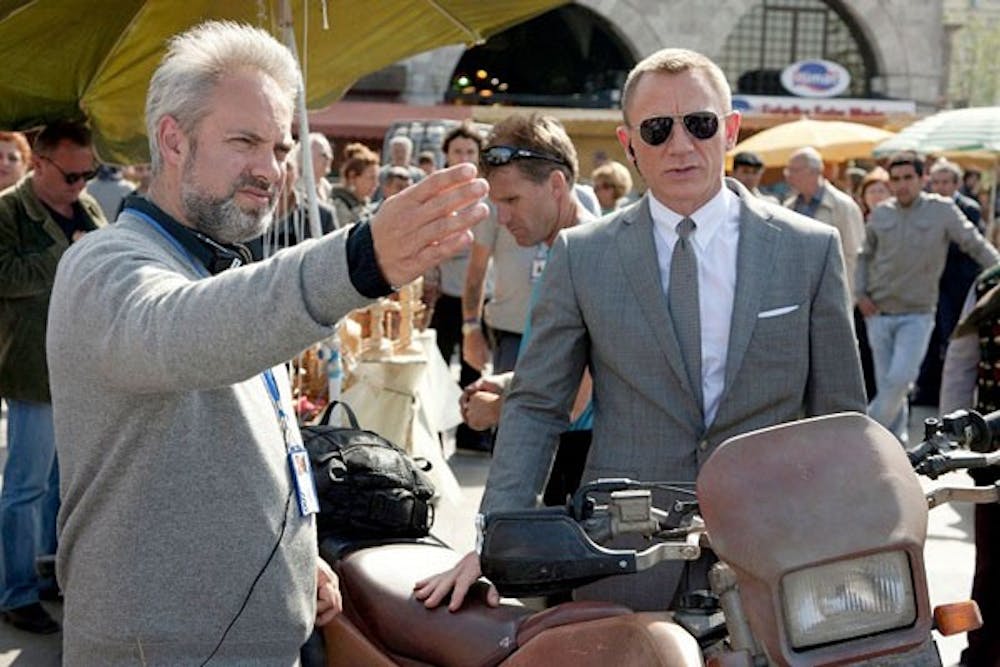 Director Sam Mendes instructing Daniel Craig on a scene in the 23rd James Bond film, "Skyfall." (Photo courtesy of Metro-Goldwyn-mayer/Columbia Pictures)
Director Sam Mendes instructing Daniel Craig on a scene in the 23rd James Bond film, "Skyfall." (Photo courtesy of Metro-Goldwyn-mayer/Columbia Pictures)Rating: R
Release: Nov. 9
Pitchforks: 5/5
“Skyfall,” the 23rd installment of the James Bond series, comments on the series’ humble literary beginnings, its past filmography and its future.
“Skyfall” makes a convincing argument for the 50-year-old series to continue on in the distant future.
The Daniel Craig era of the series, which told the 007 agent’s origins in 2006 with “Casino Royale,” continues to play with the traditional format of the films, while integrating the ideas of the past.
Actor Javier Bardem plays the Bond villain, a flamboyant former MI6 operative under the alias of Raoul Silva.
Silva blames M (Judi Dench) for the physical trauma that he received after being captured by foreign operatives, and spends much of the film enacting his long game of vengeance, while simultaneously trying to wrack her with guilt.
As a Bond villain, his characterization runs more complex, perhaps the deepest of any other villain from the past. Discussions between Silva and Bond about how the life of a spy transforms its participants for the worst feels especially mature for the series.
This meddling throws Bond and M together, a relationship that was always an important thread running through the series from the beginning. The interplay and chemistry between the duo could be likened to a maternal-like relationship, with M acting as de facto mother to Bond.
All the choreographed action in the pursuit of Silva reaches those expected high standard action sequences that the series is beloved for. However, the most surprising moment of the film comes when M makes a brief, but impassioned, speech about how villains like Silva, without rank and country, singlehandedly justify the existence of spies like James Bond. Not only did this self-aware moment give gravity to the proceedings that came before it, but it also rams the momentum of the story into overdrive.
Three films into his reign as the character, Craig finally settles in. He stands on his own two feet and escapes that immense shadow cast by the last five actors.
Usually after watching a new Bond film, the typical and involuntary reaction is to compare it to the ones that came before, and arbitrarily grade the incumbent on a scale compared to its predecessors. Is he as good as Sean Connery? As funny as Roger Moore? As hard-edged as Timothy Dalton?
Somehow he finds a median with those onscreen actors, and shows the audience a suppressed wounded soul who hides his flaws with his overconfidence and charm. It is remarkably close to the character Ian Fleming wrote in the James Bond novels.
The filmmakers make a point to acknowledge Bond’s family roots in Scotland, one of many risks that feel appropriate and somehow work.
Although not based on any single piece of source material by Fleming, “Skyfall” somehow feels like it is most loyal to the Bond novels.
Sam Mendes’ direction echoes the classically minded approach of early Bond films. His inclusion of the gorgeous foreign landscapes complements the action. Thankfully, Mendes drops the hyper-kinetic, tightly framed Bourne Ultimatum-style action that plagued the last film.
Mendes and his cinematographer Roger Deakins arrange the composition into some stunning images; the peak moment being a fight in Shanghai with its two subjects silhouetted by the neon signs in a high-rise building.
Their effort results in one of the best-looking Bond movies ever filmed.
In “Skyfall,” perennial favorites Q (Ben Whishaw) and Moneypenny (Naomie Harris) finally make their appearances in the rebooted universe. This is by far the most conventional element, yet their entrances are plotted and feel right.
The reinvention comes full circle, and much like “Goldfinger” that shepherded in two decades of fun and grand adventures, this Bond is something different. It is a new beginning. It is something old and something new.
Reach the reporter at tccoste1@asu.edu




